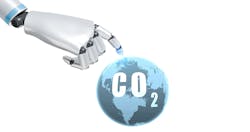No doubt, artificial intelligence (AI) has the potential to play a significant role in addressing the challenges posed by climate change. One way that planners are already utilizing AI is for so-called predictive modeling about the potential impacts of climate change on different regions and ecosystems to help identify areas that are most vulnerable and prioritize mitigation and adaptation efforts. AI algorithms’ ability to process decades of historical weather and climate data and crunch the numbers make it far superior at predicting the future than a few humans could ever be. (But at least we still need to be here to program the AI and interpret the results.)
Another way AI is already playing a role in reducing emissions is by helping optimize energy use and other systems in buildings, transportation systems and industrial processes. To wit, optimized manufacturing processes have led to reductions in greenhouse gas emissions at individual factories and other industrial facilities by as much as 40%. Direct carbon emissions from the manufacturing sector account for almost one-quarter of all U.S. greenhouse gas output; finding ways to trim back emissions therein could mean significant reductions in our overall national carbon footprint.
The ability of AI software to continuously optimize industrial processes means that the companies that employ such technology can reap a whole host of benefits beyond greenhouse gas emissions reductions, including increased yields, reduced waste, faster design iteration and less energy consumption—all which result in lower costs and higher profits. Meanwhile, AI is also in use to help industrial facilities still burning fossil fuels to monitor and optimize carbon capture and storage systems to make our dirtiest facilities do less damage.
AI is also optimizing our capture and storage of energy from renewable sources. Hydroelectric systems are using AI tools to optimize water levels according to seasonal needs and other factors. Wind farms and solar arrays are employing AI systems to improve their efficiency and reliability, which in turn makes them easier to scale as market demand dictates.
And yet another recent application of AI in the fight against climate change is monitoring and tracking deforestation by analysis of satellite imagery; this kind of climate surveillance can help detect and prevent illegal logging—and the loss of critical carbon sinks—in real time. Conservation groups like Global Forest Watch, Conservation International and World Resources Institute have pioneered various uses of AI to analyze satellite and/or drone imagery to map and monitor forests “on the fly,” so to speak.
While the climate crisis is more dire than ever these days, environmental advocates and others are keeping their fingers crossed that we can realize the potential power of AI to rein in emissions in time before things get outright cataclysmic.
EarthTalk is produced by Roddy Scheer & Doug Moss for the 501(c)3 nonprofit EarthTalk. See more at https://emagazine.com. EarthTalk produces content on green living, sustainability and climate change—and distributes it through syndication, social media and other channels.
About the Author
EarthTalk
EarthTalk is produced by Roddy Scheer & Doug Moss for the 501(c)3 nonprofit EarthTalk. See more at https://emagazine.com. EarthTalk produces content on green living, sustainability and climate change—and distributes it through syndication, social media and other channels.
